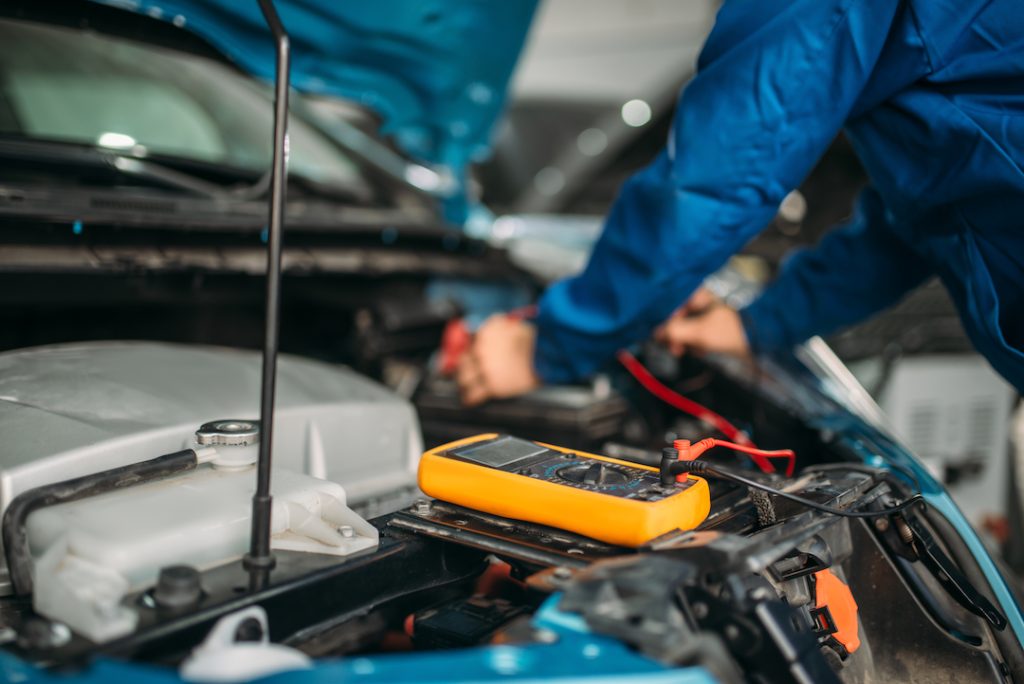Auckland Car Service – Car Battery
Your car battery is a key component of your vehicle, yet often we don’t give it a moment’s thought – until it stops working. Without a properly functioning battery, your car won’t run. Let’s take a closer look at the function of your car battery, how to extend its life, and how to ensure it operates as needed – especially in the winter months.
What exactly is an automotive battery?
Your car’s battery is a rechargeable battery that is used to start the vehicle. If you drive an internal combustion engine (ICE) vehicle, when you start your car, the battery sends a voltage to the starter, which provides the spark for the internal combustion engine. In an electric car, the battery also powers the motor, but via electrical energy supplied to the stator from the battery.
Your vehicle’s battery also provides power to the electrical components, such as the radio, lights, wipers, heater, etc.
Different types of car battery
There are actually several different types of car batteries and different ways of referring to them. You may have heard the terms VRLA (Valve Regulated Lead Acid), AGM (Absorbed Glass Mat), calcium batteries, deep cycle batteries, flooded battery or wet cell battery, lithium ion battery, enhanced flooded battery (EFB), gel cell battery (Dry Cell), and nickel metal hydride battery. These are just a few to mention – there may be more.
It’s not terribly important that you understand the difference between all of these. What’s important for the average driver to understand is that there are different types of batteries and that they’re more complex than you might initially think – so it’s important to consult your auto mechanic to check that your battery is operating as it should and that you are doing all you can to preserve the life of your car battery.
The most common types of car battery
If you drive an internal combustion engine (ICE) vehicle, it most likely uses a lead acid battery. This is a low-maintenance, sealed battery that does not need to be topped up with fluid. If your battery goes flat, it can be jump-started and recharged.
Another type of battery becoming more common is the lithium ion battery, used in a hybrid or electric vehicle (EV).
There are a number of reasons why a battery goes flat
Something has been left on – leaving an internal light on, or leaving your headlights on (for an older car that doesn’t have lights that automatically turn off) are the obvious culprits. These will drain the battery if left on accidentally overnight.
You haven’t driven your car in a while – driving your car actually charges your battery. So if you leave your vehicle for a long period of time, you may find the battery has gone flat.
You have loose or corroded battery connections – over time, the connections may jostle and become loose, or they may corrode, especially if you drive or park near sea spray.
Winter weather has flattened your battery – extreme cold conditions can increase the rate of discharge. In winter, older batteries tend to fail as they have to work even harder to crank the motor. Colder temperatures may cause the lead acid battery electrolyte to freeze or thicken, which slows the chemical reaction. A cold engine with thicker oil can also put extra strain on the battery, demanding more power to start the car.
Your battery is nearing the end of its life – there’s no hard rule on how long a car battery will last. It’s best to consult your owner’s manual for more information. A good rule of thumb, however, is that a lead acid car battery (combustion engine vehicle) should last between three and five years, and a lithium car battery (electric vehicle) should last approximately 10 to 20 years.
How to avoid a flat battery
- If you drive an older vehicle that doesn’t have lights that automatically shut off, make sure you remember to turn off the lights at the end of your drive. If you’re the forgetful type, put a little reminder note on your dashboard or in your garage.
- If you have small children with curious fingers, check that all internal lights have been turned off when you park up at the end of the day.
- If you don’t do a lot of driving, make a point of taking your car out for a spin around the block once a month to ensure the battery doesn’t go flat.
- During the winter, if you’re able to, park your vehicle in a garage instead of outside.
- Get your battery checked and tested – particularly before winter sets in. Get in touch with us at Roskill Auto Mechanical and we can run the necessary diagnostic checks to make sure your battery is running optimally.
At Roskill Auto Mechanical we are experienced in servicing all makes and models of vehicles, including hybrids and electric vehicles (EVs). We can look after all your battery queries and service needs.
Contact us online or call us on 092421870 for a free quote or to book an appointment.

